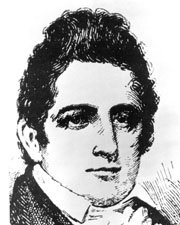Freeman Walker
| Freeman Walker | |
|---|---|
 |
|
|
United States Senator from Georgia |
|
|
In office November 6, 1819 – August 6, 1821 |
|
| Preceded by | John Forsyth |
| Succeeded by | Nicholas Ware |
| Member of the Georgia House of Representatives | |
|
In office 1807-1811 |
|
| Personal details | |
| Born |
October 25, 1780 Charles City, Virginia |
| Died | September 23, 1827 (aged 46) Augusta, Georgia |
| Political party | Democratic-Republican |
Freeman Walker (October 25, 1780 – September 23, 1827) was a United States Senator from Georgia. Born in Charles City, Virginia, he attended the common schools; in 1797, he moved to Augusta, Georgia.
Walker studied law, and was admitted to the bar in 1803, commencing practice in Augusta. He was a member of the Georgia House of Representatives from 1807 to 1811, and was mayor of Augusta in 1818 and 1819. He was elected as a Democratic-Republican to the U.S. Senate to fill the vacancy caused by the resignation of John Forsyth, serving from November 6, 1819, to August 6, 1821, when he resigned. At the time of the 1820 census he owned 46 slaves. He was again mayor of Augusta in 1823. Walker died in Augusta in 1827; interment was in the Walker family cemetery.
Freeman Walker's son was Confederate major general William H.T. Walker, who served in the American Civil War.
Freeman Walker is the fictitious main character in David Allan Cates' 2008 novel by the same name. However, there is no connection other than the 19th-century Southern U.S.; the novel is about a young mulatto slave who is manumitted by his white father. (He changes his name from Jimmy Gates to Freeman Walker.)
Walker County, Georgia, was named for Senator Walker.
Freeman Walker at Find a Grave
...
Wikipedia
